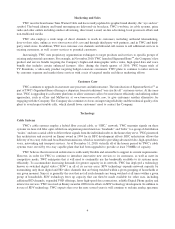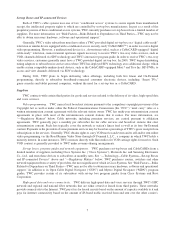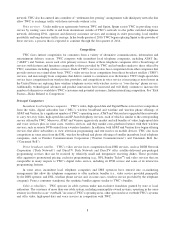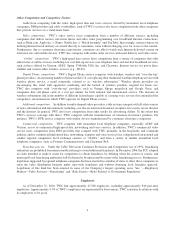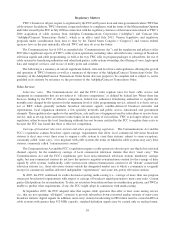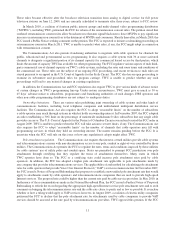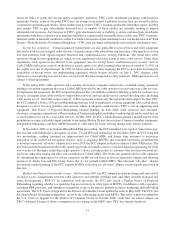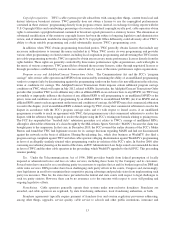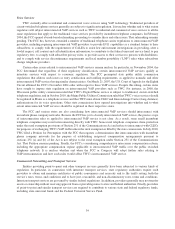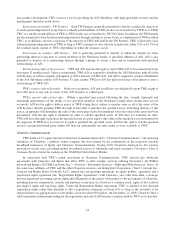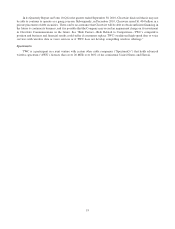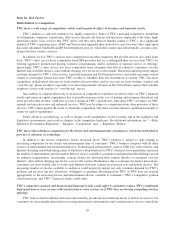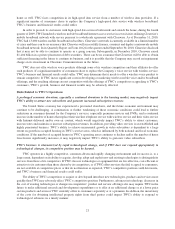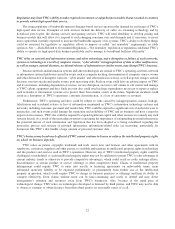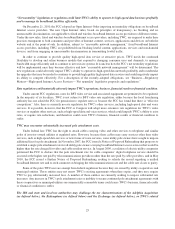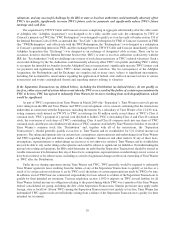Time Warner Cable 2010 Annual Report Download - page 28
Download and view the complete annual report
Please find page 28 of the 2010 Time Warner Cable annual report below. You can navigate through the pages in the report by either clicking on the pages listed below, or by using the keyword search tool below to find specific information within the annual report.Voice Services
TWC currently offers residential and commercial voice services using VoIP technology. Traditional providers of
circuit-switched telephone services generally are subject to significant regulation. It is unclear whether and to what extent
regulators will subject interconnected VoIP services such as TWC’s residential and commercial voice services to all the
same regulations that apply to the traditional voice services provided by incumbent telephone companies. In February
2004, the FCC opened a broad-based rulemaking proceeding to consider these and other issues. That rulemaking remains
pending. The FCC has, however, extended a number of traditional telephone carrier regulations to interconnected VoIP
providers, including requiring interconnected VoIP providers: to provide E911 capabilities as a standard feature to their
subscribers; to comply with the requirements of CALEA to assist law enforcement investigations in providing, after a
lawful request, call content and call identification information; to contribute to the federal universal service fund; to pay
regulatory fees; to comply with subscriber privacy rules; to provide access to their services to persons with disabilities;
and to comply with service discontinuance requirements and local number portability (“LNP”) rules when subscribers
change telephone providers.
Certain other issues related to interconnected VoIP services remain unclear. In particular, in November 2004, the
FCC determined that regardless of their regulatory classification, certain interconnected VoIP services qualify as
interstate services with respect to economic regulation. The FCC preempted state public utility commission
regulations that address such issues as entry certification and tariffing requirements, as applied to nomadic and other
interconnected VoIP services having similar characteristics. On March 21, 2007, the U.S. Court of Appeals for the Eighth
Circuit affirmed the FCC’s November 2004 order with respect to these VoIP services. Despite this ruling, certain states
have sought to impose state regulation on interconnected VoIP providers such as TWC. For instance, in 2008, the
Wisconsin public utility commission ruled that TWC’s Digital Phone service is subject to traditional, circuit-switched
telephone regulation, and in October 2010, the Maine Public Utilities Commission ruled that TWC’s voice services should
be regulated in Maine as a telephone service and that TWC must obtain CLEC and Interexchange Carrier (long-distance)
authorizations for its voice operations. Other state commissions have opened investigations into whether and to what
extent interconnected VoIP services should be regulated in their respective states.
The FCC and various states are also considering how interconnected VoIP services should interconnect with
incumbent phone company networks. Because the FCC has yet to classify interconnected VoIP service, the precise scope
of interconnection rules as applied to interconnected VoIP service is not clear. As a result, some small incumbent
telephone companies may resist interconnecting directly with TWC. Some rural telephone companies claim protection
under the rural exemption provisions of Section 251 of the Communications Act and refuse to interconnect with CLECs
for purposes of exchanging TWC’s VoIP traffic unless the rural exemption is lifted by the state commission. In July 2010,
TWC filed a Petition for Preemption with the FCC that requests a determination that interconnection with incumbent
phone company networks for the purpose of establishing reciprocal compensation arrangements pursuant to
sections 251 (a) and (b) of the Act is not subject to the rural exemption under Section 251 of the Communications
Act. That Petition remains pending. Finally, the FCC is considering comprehensive intercarrier compensation reform,
including the appropriate compensation regime applicable to interconnected VoIP traffic over the public switched
telephone network. It is unclear whether and when the FCC or Congress will adopt further rules relating to
VoIP interconnection and how such rules would affect TWC’s interconnected VoIP service.
Commercial Networking and Transport Services
Entities providing point-to-point and other transport services generally have been subjected to various kinds of
regulation. In particular, in connection with intrastate transport services, state regulatory authorities require such
providers to obtain and maintain certificates of public convenience and necessity and to file tariffs setting forth the
service’s rates, terms, and conditions and to have just, reasonable, and non-discriminatory rates, terms and conditions.
Interstate transport services are governed by similar federal regulations. In addition, providers generally may not transfer
assets or ownership without receiving approval from or providing notice to state and federal authorities. Finally, providers
of point-to-point and similar transport services are required to contribute to various state and federal regulatory funds,
including state universal funds and the Federal Universal Service Fund.
16


